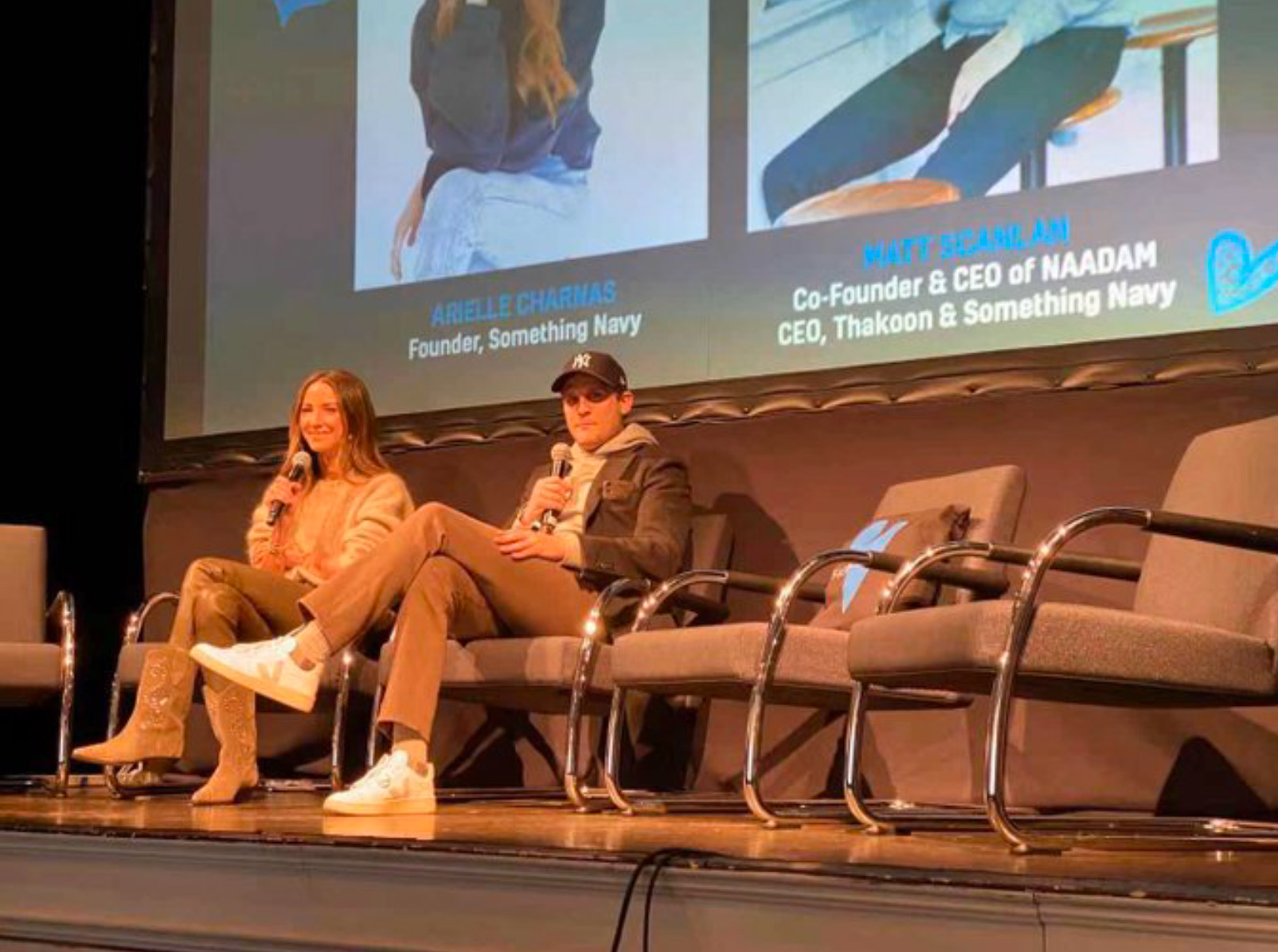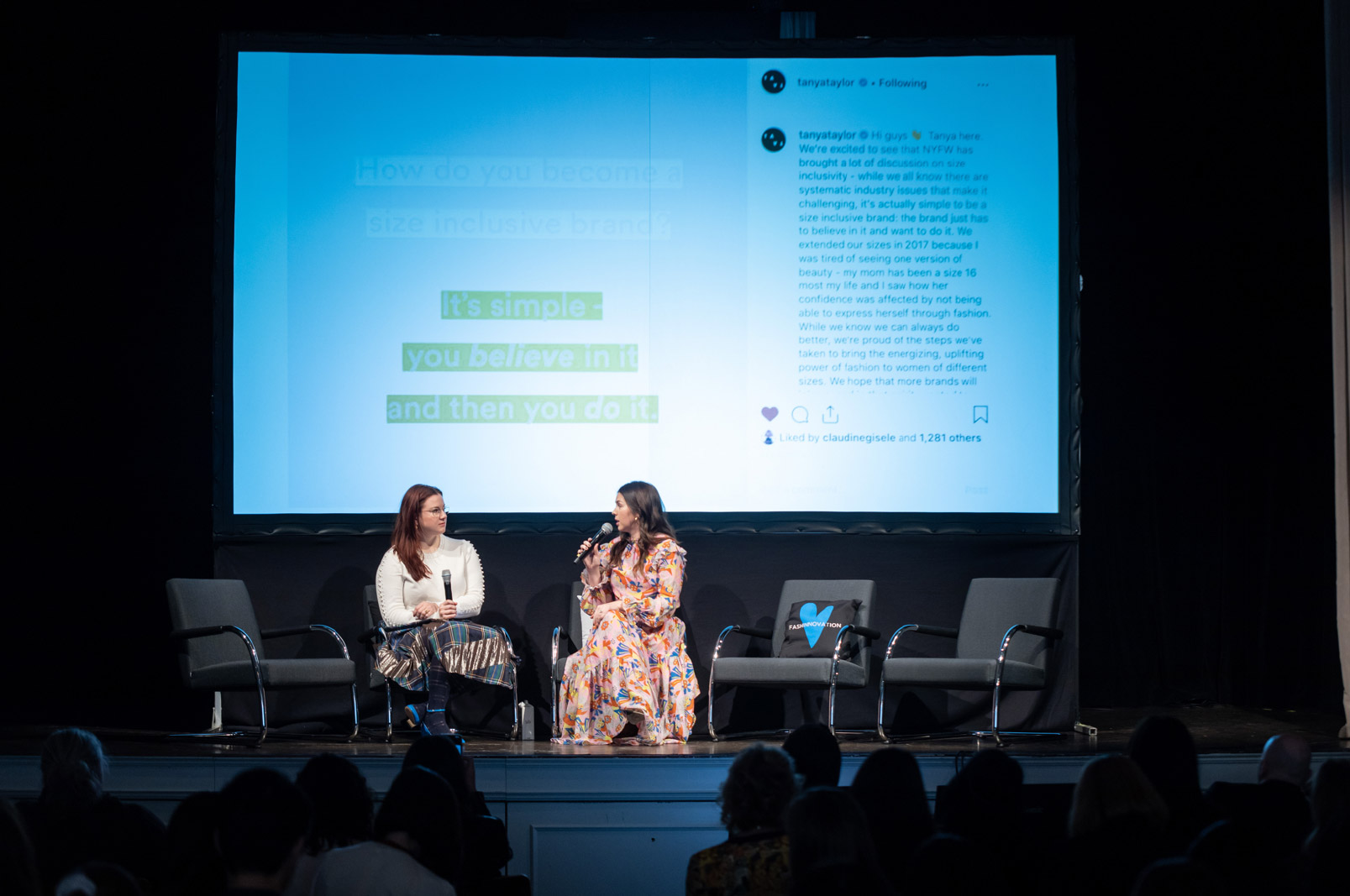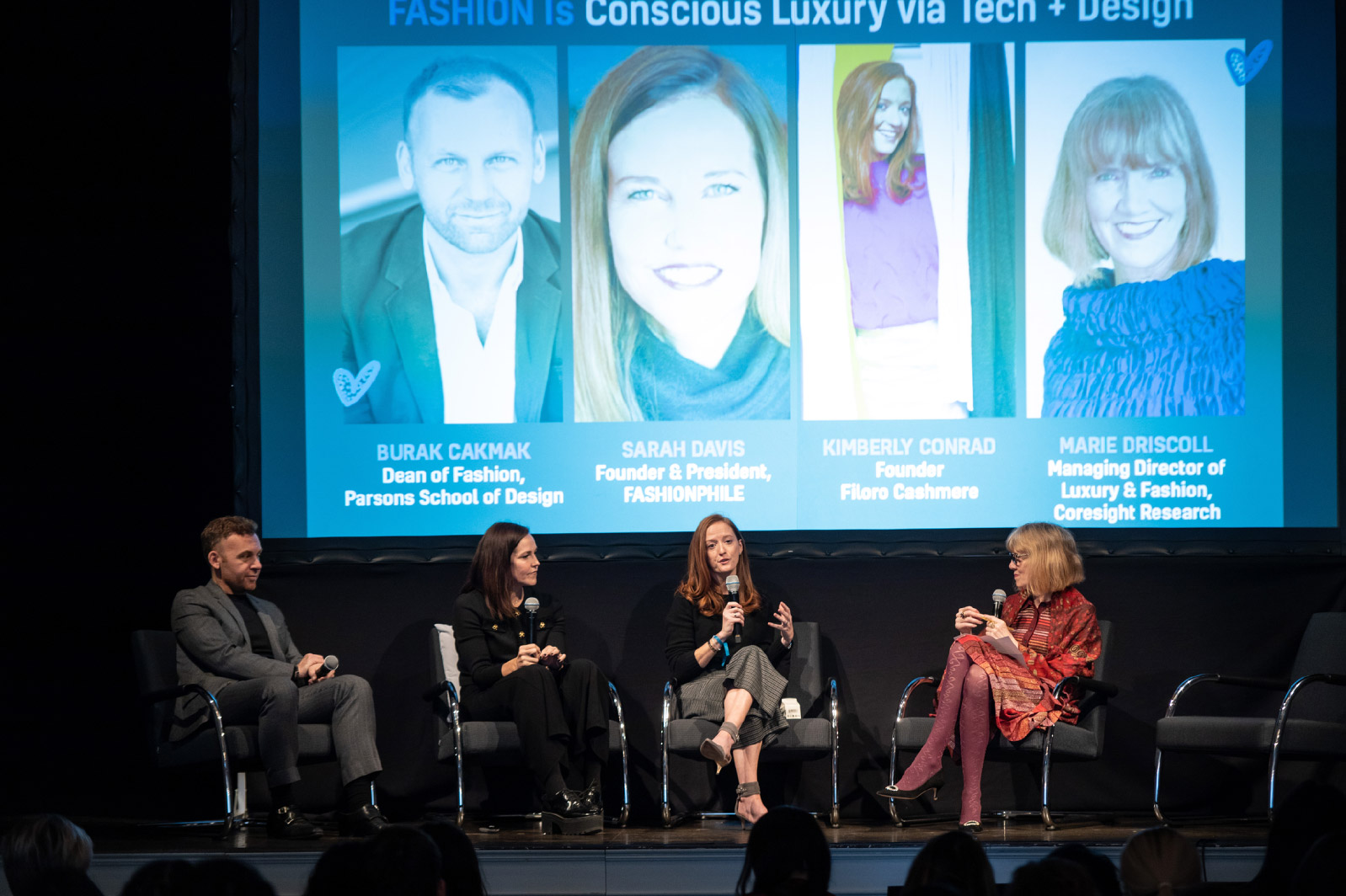
DIpil Das
The Coresight Research team was in New York for the Fashinnovation conference on February 5. The conference featured business leaders, fashion designers and innovators, getting together to discuss the latest trends in fashion’s cultural impact.
These are the key themes of the one-day event.
Entrepreneurship in Fashion
Today’s fashion entrepreneurs are striving to build businesses that make a difference in the world. Businesses that make money but pursue a path greater than just profit can truly win. Entrepreneurs need to create ethical and transparent businesses that also make people’s life easier, they need to connect with consumers at a level unprecedented in retail history and need to more quickly understand their customers than ever before.
Arielle Charnas, Founder of Something Navy, kicked off the panel discussion “Fashion is… Influencing Towards Entrepreneurship” by talking about how her work building the brand Something Navy was influenced others. Charnas started a blog and Instagram account for the brand early in 2009, and through this, motivated millions of her followers to embrace fashion.
Charnas went on to say the core of her business was the ability to have a conversation with the consumer, and that to do that effectively entrepreneurs need access to consumer data.
“Data is everything,” says Charnas. “Having a conversation with the consumer can get more consumer data, can help decide style, price, and corporate strategy, ultimately to make an influence.” Connectivity is the DNA of entrepreneurship: Only by initiating a dialogue with the consumer can a brand grow.
Consumers want to know the product. They want to assess quality and price—but they also want to feel they “know” the brand, and that comes with engagement. Meanwhile, brands want to know consumer preferences and what they expect of a product. Today’s consumers are more loyal to brands whose values resonate with their own, and that includes far more intangible factors such as corporate values and who they are as a company.
Matt Scanlan, CEO and Co-Founder at Naadam, a luxury knitwear startup that offers sustainable Mongolian cashmere clothing, shared his secret weapon in reaching consumers. “One of the biggest challenges is to ensure product authenticity,” said Scanlan. “And, put the customer at the center.” Entrepreneurs need to build their brands around the customer’s life.
Burak Cakmak, Dean of Fashion at the Parsons School of Design, believed that making influence in business was always about quality product. And, today’s world is more democratic, which makes scarcity another important component as a game-changer, such as Hermès’ Birkin bag and drops in streetwear.
[caption id="attachment_103437" align="aligncenter" width="700"] Arielle Charnas, Founder of Something Navy, and Matt Scanlan, Co-Founder & CEO of Naadam, talk about the importance of consumer-centric strategy
Arielle Charnas, Founder of Something Navy, and Matt Scanlan, Co-Founder & CEO of Naadam, talk about the importance of consumer-centric strategy
Source: Coresight Research[/caption] Inclusivity The fashion industry is paying more attention to the diversity of culture and sizes. Tanya Taylor, CEO and Creative Director of Tanya Taylor, found that only 15% of her company’s inventory was offered in extended sizing, which she saw as an opportunity to extend the plus-size line. With the help of a dedicated plus-size key tech designer, she was able to double the number of plus-size products—which helped drive sales. Taylor also called on fashion schools to teach plus-size design, and went on Instagram to promote size-inclusive tips. “Everything promoting inclusivity is not that hard,” she said, “but it takes commitment. It’s simple. You believe in it and then you do it.” [caption id="attachment_103438" align="aligncenter" width="700"] Tanya Taylor, CEO and Creative Director of Tanya Taylor, and Tyler McCall, Editor in Chief of Fashionista.com, discuss the state of fashion inclusivity
Tanya Taylor, CEO and Creative Director of Tanya Taylor, and Tyler McCall, Editor in Chief of Fashionista.com, discuss the state of fashion inclusivity
Source: Coresight Research [/caption] Sustainability and Conscious Luxury Sustainability is no longer a simple buzzword. It has become a new norm, especially for retailers examining their supply chains and for consumers trying to decide what to buy. Although the fashion industry does not have a standard definition of sustainability, one thing is clear: People want eco-friendly choices. An overwhelming 93% of global consumers expect the brands they use to support social and environmental issues and 54% believe they can make a difference with their purchases. The growing consumer consciousness around sustainability requires brands and retailers to change. “Everyone is learning about sustainability and it is important to hold brands accountable,” said Lucie Brigham, Chief of Office for Partnerships at the United Nations Conscious Fashion Campaign. “We should all be working towards the greater good with circularity and interconnectedness.” Sandra Campos, CEO of Dianne von Furstenberg, concurred: “The industry has changed so rapidly in the last 10 years. Social media didn’t exist (then), but today it’s absolutely essential. Now we have to talk about sustainability, a circular economy and a new business model.” Companies are researching and developing more environmentally friendly products and communicating their commitment to sustainability to consumers, investors and employees. Everlane launched a sustainable down coat while Wrangler launched a menswear denim line using 100% sustainable cotton. Even luxury is becoming increasingly conscious of its role in fashion sustainability as consumers pay more attention to where products come from and how they affect the environment in terms of manufacture, supply chain, the workers who make them and the communities in which they are made. This new conscious luxury is compelling upmarket brands to look more closely at their own environmental footprints. [caption id="attachment_103439" align="aligncenter" width="700"] Marie Driscoll, Managing Director of Luxury & Fashion at Coresight Research, moderates the discussion on conscious luxury
Marie Driscoll, Managing Director of Luxury & Fashion at Coresight Research, moderates the discussion on conscious luxury
Source: Coresight Research [/caption] Kimberley Conrad, founder of Filoro Cashmere, shared his sustainable fashion story. Filoro offers a collection of recycled cashmere, made from material that is 60% pre-consumer recycled cashmere, 35% recycled cashmere and 5% extrafine merino wool and certified by the Global Recycled Standard. Sarah Davis, Founder and President of Fashionphile, then talked about the rise of resale business model. Neiman Marcus has purchased a minority stake in Fashionphile, aiming to enter the resale market. Sarah said: “The resale market provides a new platform for consumers to enjoy luxury at lower points and is a gateway channel to sustainability.”
 Arielle Charnas, Founder of Something Navy, and Matt Scanlan, Co-Founder & CEO of Naadam, talk about the importance of consumer-centric strategy
Arielle Charnas, Founder of Something Navy, and Matt Scanlan, Co-Founder & CEO of Naadam, talk about the importance of consumer-centric strategy Source: Coresight Research[/caption] Inclusivity The fashion industry is paying more attention to the diversity of culture and sizes. Tanya Taylor, CEO and Creative Director of Tanya Taylor, found that only 15% of her company’s inventory was offered in extended sizing, which she saw as an opportunity to extend the plus-size line. With the help of a dedicated plus-size key tech designer, she was able to double the number of plus-size products—which helped drive sales. Taylor also called on fashion schools to teach plus-size design, and went on Instagram to promote size-inclusive tips. “Everything promoting inclusivity is not that hard,” she said, “but it takes commitment. It’s simple. You believe in it and then you do it.” [caption id="attachment_103438" align="aligncenter" width="700"]
 Tanya Taylor, CEO and Creative Director of Tanya Taylor, and Tyler McCall, Editor in Chief of Fashionista.com, discuss the state of fashion inclusivity
Tanya Taylor, CEO and Creative Director of Tanya Taylor, and Tyler McCall, Editor in Chief of Fashionista.com, discuss the state of fashion inclusivity Source: Coresight Research [/caption] Sustainability and Conscious Luxury Sustainability is no longer a simple buzzword. It has become a new norm, especially for retailers examining their supply chains and for consumers trying to decide what to buy. Although the fashion industry does not have a standard definition of sustainability, one thing is clear: People want eco-friendly choices. An overwhelming 93% of global consumers expect the brands they use to support social and environmental issues and 54% believe they can make a difference with their purchases. The growing consumer consciousness around sustainability requires brands and retailers to change. “Everyone is learning about sustainability and it is important to hold brands accountable,” said Lucie Brigham, Chief of Office for Partnerships at the United Nations Conscious Fashion Campaign. “We should all be working towards the greater good with circularity and interconnectedness.” Sandra Campos, CEO of Dianne von Furstenberg, concurred: “The industry has changed so rapidly in the last 10 years. Social media didn’t exist (then), but today it’s absolutely essential. Now we have to talk about sustainability, a circular economy and a new business model.” Companies are researching and developing more environmentally friendly products and communicating their commitment to sustainability to consumers, investors and employees. Everlane launched a sustainable down coat while Wrangler launched a menswear denim line using 100% sustainable cotton. Even luxury is becoming increasingly conscious of its role in fashion sustainability as consumers pay more attention to where products come from and how they affect the environment in terms of manufacture, supply chain, the workers who make them and the communities in which they are made. This new conscious luxury is compelling upmarket brands to look more closely at their own environmental footprints. [caption id="attachment_103439" align="aligncenter" width="700"]
 Marie Driscoll, Managing Director of Luxury & Fashion at Coresight Research, moderates the discussion on conscious luxury
Marie Driscoll, Managing Director of Luxury & Fashion at Coresight Research, moderates the discussion on conscious luxury Source: Coresight Research [/caption] Kimberley Conrad, founder of Filoro Cashmere, shared his sustainable fashion story. Filoro offers a collection of recycled cashmere, made from material that is 60% pre-consumer recycled cashmere, 35% recycled cashmere and 5% extrafine merino wool and certified by the Global Recycled Standard. Sarah Davis, Founder and President of Fashionphile, then talked about the rise of resale business model. Neiman Marcus has purchased a minority stake in Fashionphile, aiming to enter the resale market. Sarah said: “The resale market provides a new platform for consumers to enjoy luxury at lower points and is a gateway channel to sustainability.”